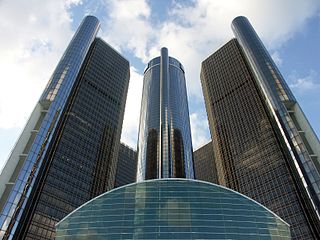Why Did General Motors Stall?

General Motors knew about defective ignition switches for almost a decade before ordering recalls
 General Motors Headquarters in Detroit Related Links |
Over a nine-year period, 164 drivers complained to the National Highway Traffic Safety Administration (NHTSA) that their Chevrolet Cobalts stalled without warning. The Cobalts involved in the complaints were 2005, 2006 or 2007 models. The complaints far outnumbered those of any of the car's competition from the same years with one exception: Toyota Corolla, which had been investigated by the U.S. government in 2010 and recalled.
Cars Finally Recalled
The stalling without warning was due to ignition failure in Cobalts. In February 2014, General Motors recalled 1.6 million Cobalts as well as other compact cars such as the Saturn Ion and Pontiac G5 for ignition switch failure. By late March, another 971,000 cars from the years 2008-2011 had been recalled because of faulty replacement switches. On May 15, the company recalled 2.7 million more cars, including the Chevrolet Malibu, Pontiac G6, and Saturn Aura. The automaker asked for six new recalls of more than 8.4 million vehicles by late June, most of which were again for ignition switch failure.
As explained by General Motors, the faulty ignition switch slips out of its run position into the accessory position because of the weight on the key chain. The slip causes the engine to stall. When this happens, power steering, power-assisted breaks and air bags become disabled. As of 2014, this ignition failure has caused at least 13 deaths and dozens of wrecks.
According to an Associated Press analysis, NHTSA had evidence of the faulty switches as early as 2005. During the summer of 2005, NHTSA hired a contractor to investigate a crash on July 29, 2005, that killed Amber Marie Rose. According to the contractor's report, Rose, age 16, had been driving a 2005 Cobalt when the ignition switch moved from the run position to accessory and the airbags did not inflate. However, the report also said that speed and alcohol were factors.
New CEO Testifies
General Motors recently acknowledged that it has known about the defective ignition switch for almost a decade. On April 1, 2014, the current heads of NHTSA and General Motors, including new General Motors CEO Mary Barra, were called to testify before the House and Senate subcommittees. They were asked to explain why it took so long for car owners to be told about the potentially deadly defect in their cars.
During the hearings, Barra said that many of the answers Congress is looking for will come out of an internal General Motors investigation. According to Barra that investigation should be completed within 45 to 60 days. When members of the Senate subcommittee suggested that General Motors tell the owners of the defective cars to stop driving them, Barra responded by saying that she would let her own son get behind the wheel of one if he took certain precautions.
Criminal Investigation
When asked how General Motors was handling the problem, Barra admitted that she was unaware of certain details to which California Senator Barbara Boxer responded, "You don't know anything about anything." Boxer went on to say, "If this is the new GM leadership, it's pretty lacking." Saturday Night Live even poked fun at Barra's testimony during a skit that mocked the CEO for having few answers. In response to the hearings, New Hampshire Senator and former prosecutor Kelly Ayotte said, "I don't see this as anything but criminal."
The Justice Department is conducting a criminal investigation of how General Motor's handled the recall. Barra has promised that the investigation will have General Motors complete cooperation. U.S. Transportation Secretary Anthony Foxx has also asked for an internal investigation since his department is in charge of auto safety.
Didn't Take Responsibility
On June 5, 2014, Barra announced that General Motors had completed its internal investigation and found that there was no deliberate cover-up by the company. The investigation also found that top management had been unaware of the matter until the recalls earlier this year. However, the company fired 15 people as a result of the internal investigation. “Some were removed because of what we consider misconduct or incompetence. Others have been relieved because they simply didn’t do enough: They didn’t take responsibility; didn’t act with any sense of urgency,“ Barra said during her announcement.
General Motors issued 72 recalls internationally for a total of 29.95 million vehicles in 2014. That was just under the industry-wide 2004 record of 30.8 million recalls. By the end of the year, the state of Arizona filed a $3 billion lawsuit against the automaker in response to the number of recalls. The lawsuit alleged that General Motors misled car buyers intentionally. A similar suit was also filed by a group of private attorneys.
Source: National Highway Traffic Safety Administration, Associated Press
by Jennie Wood







